CSotD: Bizarro President Takes the Reins
Skip to comments
This is a “where to start” day, but we’ll lead off with Non Sequitur (AMS), because, while I don’t blame it all on the media, I agree with Wiley that the states that were so important a few weeks ago are no longer on anyone’s mind.
Election promises are famous for being empty, but I don’t recall a lot of specific pledges this time around except for the dire things Trump said about California, a state he had no hope of winning but used as an anti-liberal punching bag.
He won’t likely be able to withhold federal aid when they have wildfires or other disasters, and most of his other threats — if they go through — will land on everyone, not just the Californians. In fact, it seemed that most of what either candidate said in these barnstorming speeches was national rather than local, even in states they absolutely had to win.
But back in 2016, Hilary Clinton told Ohioans that coal was a fading industry and that she would offer them retraining and new employment opportunities, while Trump promised that he would revive coal and there would be more jobs in the mines than ever.
He won and about a third of the jobs in the coal industry disappeared. It’s not that he did anything to make them go away, but he did nothing to preserve them, either, nor did people there get retraining or new jobs.
But they voted for him then, and again in 2020 and yet again in this past election.
So much for promises.
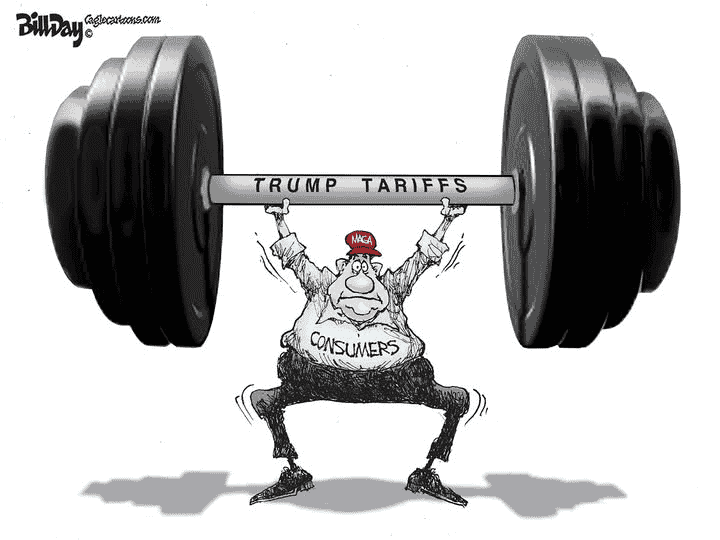
Now, the six-time bankrupted business tyro is proposing tariffs, which he seems to still believe are paid by exporters. Bill Day, however, gets it right in pointing out who would end up with the burden.
This does not make Day a genius. He is simply one of many, many people who understand how tariffs work and who know who ends up paying them. It doesn’t take a business degree, and, clearly, Trump’s business degree didn’t include this very basic concept.
We ought not to forget that one of Dear Leader’s earliest lies was the claim that he had graduated from Wharton with honors, which was quickly disproven by people who dug up the commencement program from his graduating class.
We should also bear in mind that, while he had demanded that Obama’s academic record be released, he threatened to sue schools for making his own grades public.
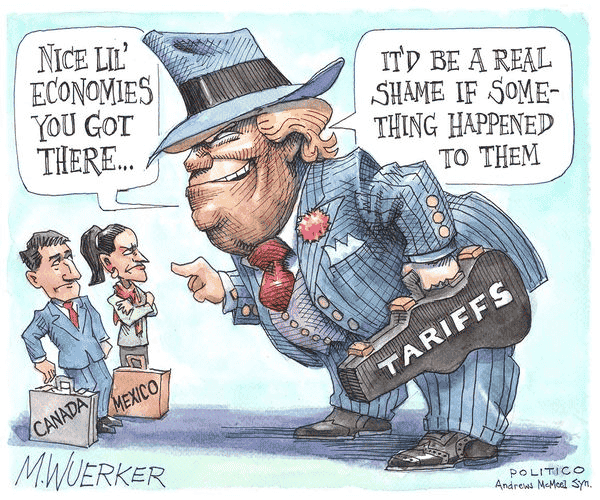
Now, as Matt Wuerker (Politico) indicates, while he may not know how tariffs work, he’s not above using them to threaten Canada and Mexico. Wuerker properly avoids showing them cowering under the threats, and while their economies are smaller than ours, neither leader is taking Trump’s bullying quietly.
Nor should they, because it’s not a one-sided exchange, and they have the power to retaliate with tariffs of their own. Trade wars would seriously impact both our citizens and our industries.
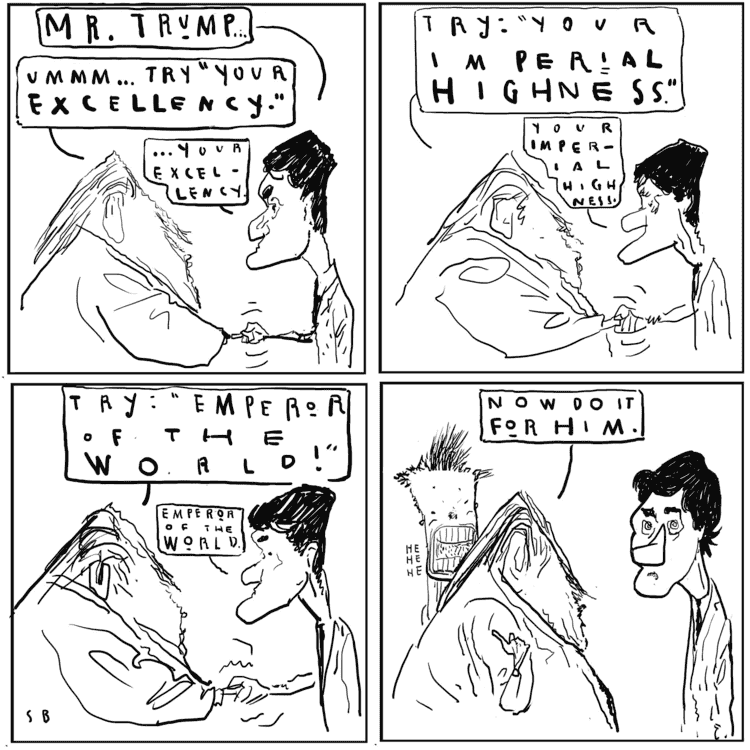
It has also been pointed out that, while Trump won those important Electoral College states, he didn’t quite crack 50% of the popular vote and, far from having a mandate, he has one of the narrowest margins of victory in the past century.
Steve Brodner notes his prideful arrogance, and the bizarre fact that he seems to be making Elon Musk a more visible governing partner than the suddenly invisible JD Whatshisface.
But the reality is no more ridiculous than Brodner’s depiction, and while world leaders have to respect our power they surely cannot be respecting our leader.
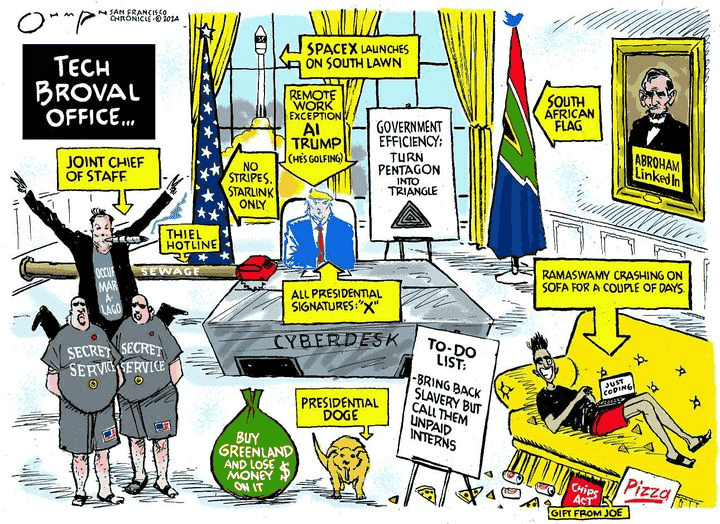
Jack Ohman (Tribune) depicts the absurdity of Trump’s planning so far, and he employs a great deal of exaggeration but not a whole lot of actual invention.
Certainly, we expect a new administration to alter the way things are done and to bring in its own policies and priorities.
But the collection of misfit nominees and odd, impractical policy shifts promised so far don’t reveal a plan beyond not doing what has been done in the past.

It’s a reminder of the Bizarro Superman storylines, in which an odd-looking clone of the superhero simply did everything backwards.
Amusing in the comics, not so funny in real life.
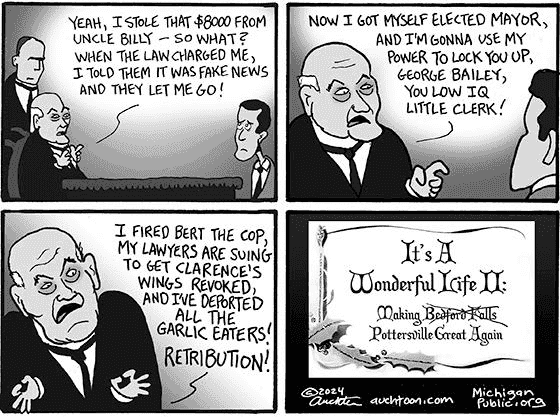
While speaking of story-reversals, John Auchter offers a vision of how It’s A Wonderful Life might play out in a Bizarro world in which Mr. Potter has the drive and power to push his own priorities past the bounds of common decency and popular acceptance that were assumed in that Frank Capra classic.
Still, as stated, Trump hasn’t got a major mandate, and not every vote he got was from a True Believer.
What would it take for those less dedicated supporters to lose faith?
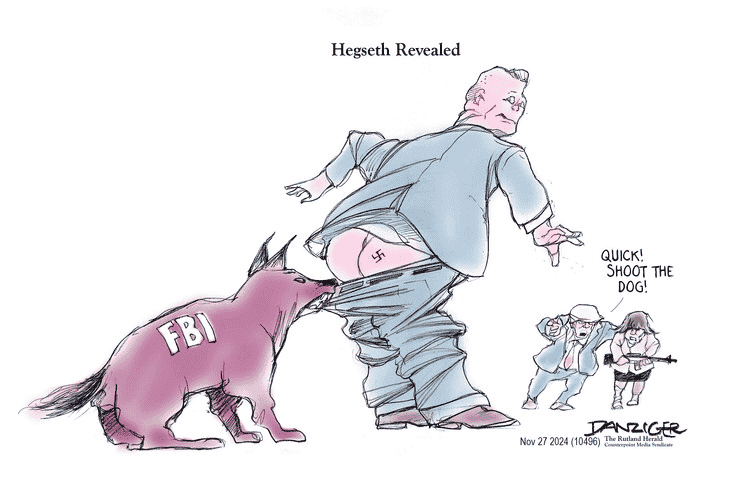
Jeff Danziger (Counterpoint) notes that, Matt Gaetz having been driven from consideration, Pete Hegsith’s halo has now started to slip. Danziger focuses on his white supremacy tattoos, which go along with his support of war crimes and denouncing of not just NATO and the UN but the Geneva Convention.
He’s also accused veterans of sponging from the system in claiming dubious health issues.
Meanwhile, as Danziger points out, Trump is not having his nominees go through the standard, traditional background checks, which would not only reveal character flaws but might help the administration avoid assembling a cabinet of people who couldn’t qualify for a security clearance and would have to slip into Trump’s bathroom in order to read top secret materials.
So far, Trump’s collection of odd hangers-on has aroused deep concern from Democrats and both horror and ridicule from progressive cartoonists, but the public seems less engaged in the debate.
Oddly enough, what may sink Hegsith is not his fascist views or his intentions to dismantle the Pentagon’s command structure, but the email from his mother scolding him for his treatment of women.
Though serial adultery and sexual assault doesn’t seem to have lowered Dear Leader’s public acceptance.
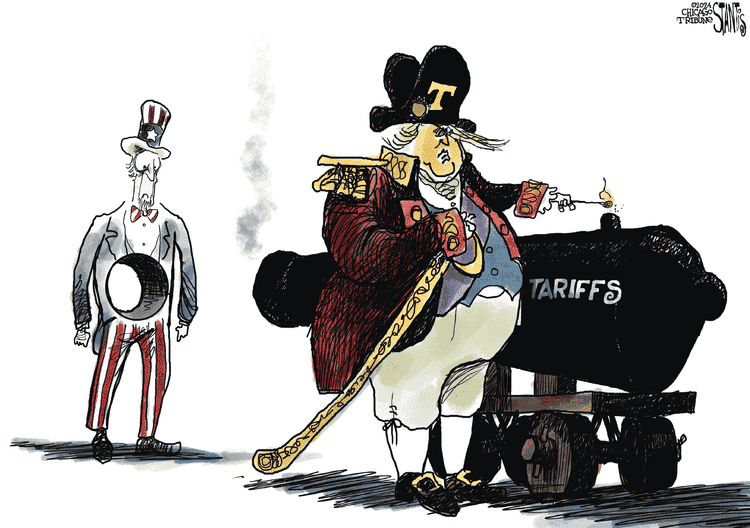
However, while voters may not follow international policy issues or care about personal integrity, they voted on kitchen table issues in this last election, and they will likely respond to them again: As Scott Stantis indicates, touching off a trade war now would be the surest way for Trump to destroy his congressional majorities in the 2026 midterms.
Which might make 25% price increases in food and gasoline prices a worthwhile, if painful, investment in America’s future.


Comments 7
Comments are closed.